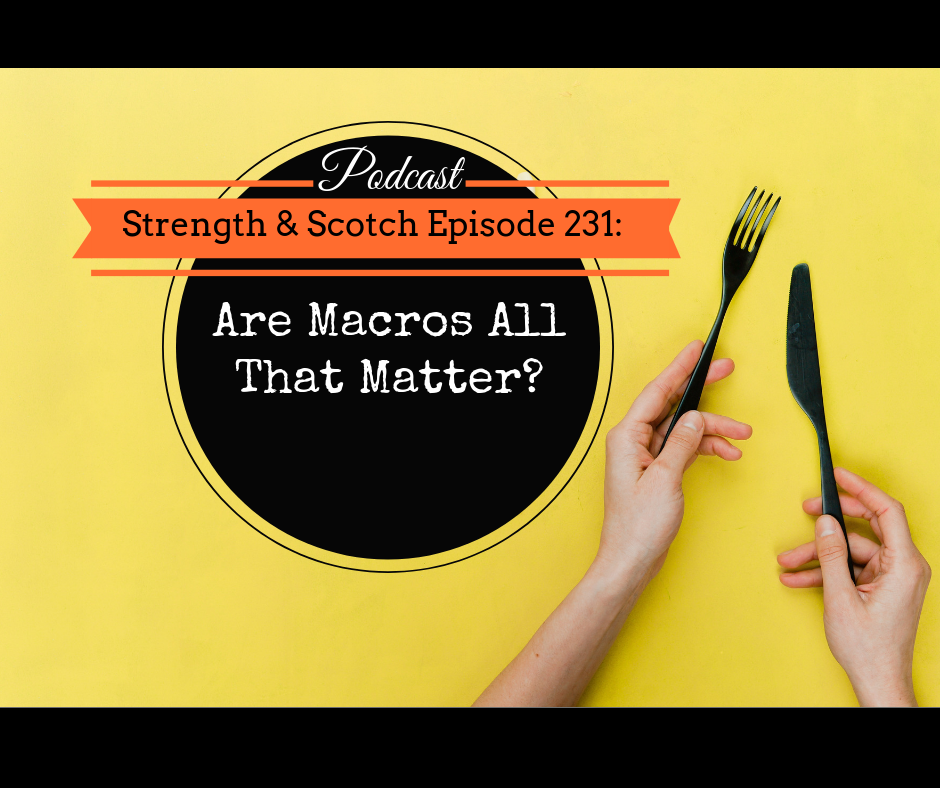Episode 231 Show Notes
Grant and Heavey are covering macros today, again – always great to cover macros! They take on a couple studies concerning the effect of healthy snacking on weight loss and the difference between having an unprocessed vs. a processed diet. They also touch on how cooking may just be what you need to shed off those pounds.
[01:43] How Good Is Omega-3 in Your Diet?
Grant presents an article about an observational study that looked at 500 children between the ages of 9 and 11. They found out how many times the children ate fish the previous month from never to at least once per week. They did this over a period of time, and once the kids hit the age of 12, they completed an IQ test to score their verbal and nonverbal skills. Children who said they ate fish weekly scored 4.8 points higher on their IQ test. Kids also showed improved sleep and fewer sleep disturbances compared to children that ate less fish. The major takeaway from this is they recommend adding fish to a child’s diet as early as possible, even beginning at the age of 2.
Heavey adds that eating fish is not only beneficial to kids, but also to adults as well. Hence, incorporating that into our diet is beneficial to all.
[07:15] We’re Covering Macros
With a lot of noise around the argument about which type of diet or which macro should be prioritized, carb and fat seem to get all the attention. Heavey thinks a lot of that distracts from the thing that’s going to help most people. This episode focuses more on how processed the food is and what its implications are.
A lot of times, people say they eat a clean diet on unprocessed foods. While some people say it’s really just about the macros. If you have a processed food diet, your ability to maintain a lower caloric intake is compromised. There’s a much higher propensity when you’re eating processed foods to have a higher caloric intake.
[09:35] Overfocus on Macros Misses the Micros
There have been studies on people who focus on processed foods can tend to get a little tunneled-vision on what they eat. They don’t expose themselves to a wide set of foods so they’re not able to get as good of a micronutrient profile as other people that are eating processed foods which are enriched with micronutrients. This being said, micronutrients are important although they could play a lesser role in terms of body composition and obesity. Regardless, people still focus on the idea that carbohydrate consumption and obesity track each other in the U.S. Heavey says this is not true. They went up together for a while, but carb consumption has been decreasing for many years now and obesity and diabetes are continuing to increase. Additionally, diabetes and obesity epidemics have actually tracked the industrialization of our food system. Unfortunately, people are not talking about this much.
[11:27] Unprocessed vs Processed Snacks
Traditionally, people eat apple as their carbs. Some people are fearful of that, others are not. A study had people consume a meal and found out the baseline calories as they consumed the meal on average at 1,000 calories. Prior to their meal, they would have the people consume a snack by having slices of apple. They found that those having apple snack an hour before their meal, the combination of the calories from the apple and the dinner was less by a couple hundred calories. Hence, they suggest that having a snack of unprocessed food decreased their total caloric intake.
They compared this with giving another group processed apple sauce. They found that from 800 total calories, it went up to over 900. So there was a measurable increase in the total calories, still less than what they would have consumed by just having that snack. They also looked at two more groups. One was taking apple juice with fiber and they found the group to have almost as many calories as the group that didn’t have a snack. The last group was taking apple juice without fiber. The group ended up having the same amount of calories as the group that had no snack. So the more we process it, the more we eat.
Another takeaway here is that some snacks can actually reduce your total caloric intake. For people that are having trouble coping with hunger when they’re looking to lose weight, having unprocessed snack before a meal can actually reduce your caloric intake.
[15:05] Don’t Eat Too Fast!
Heavey found another study that suggests that eating rates are correlated with increased overall intake. The found that a 20% change in eating rate can impact energy intake by 10-13%. Hence, eating slower does seem like it will help you eat less.
[16:26] Unprocessed vs Processed Diet
Another study Heavey found took 20 weight-stable individuals that were 31 years old on average. They randomized them into either consuming an ultra-processed diet for two weeks or an unprocessed diet for two weeks. All the meals were provided to them. They were in an inpatient facility so their entire environment was controlled. They started with the unprocessed diet then switched the following two weeks. So whatever diet they started with, they switched to the other one for the following two weeks. The order was randomized.
They also designed the meals to be matched in micronutrient composition. The ultra-processed and the unprocessed foods had the same macros, the same energy density. This is interesting because processed foods are known to be more energy-dense. This is one reason it’s speculated why you can overeat on them.
The amount of calories was not controlled. So they gave the participants an equivalent of two times their estimated amount of calories they need to maintain their weight. They made that available to them. The result showed that those on ultra-processed dieters ate 508 more calories per day compared to the unprocessed dieters. So the subjects on the unprocessed diet lost 1.1 kg over the two weeks and while they were on the 2-week ultra-processed diet, they ended up gaining 0.8 kg.
Heavey underlines the importance of controlling these things as much as possible. He believes having unprocessed foods would be the key intervention when it comes to losing weight. The hardest part about losing weight is to keep doing it over time. People can lose weight over a short period of time so that’s not a problem, but the tough part is maintaining it.
[22:10] Can You Cook?
It’s easy to shop for food at the market, but most people don’t have the skills to make meals from raw ingredients. This is a greater challenge for people who want to incorporate this advice into their diet. Not to mention that healthier foods tend to be more expensive.
Grant recommends googling recipes if this is something you’re interested in. There are actually a ton of recipes that require short prep time, are delicious, and that use unprocessed foods. He further adds that there are a lot of other factors you need to consider like learning to prioritize sleep and managing stress.
[27:30] Want to Know More About Nutrition?
Sign up for Heavey’s monthly newsletter to have a glimpse of what he’s currently researching. Go to strengthandscotch/emailme.
Links
The Effect of Fruit in Different Forms on Energy Intake and Satiety at a Meal

Check out the gear page for everything Strength & Scotch! You’ll find a listing of all the supplements and other programs we’ve discussed on the show as well as our killer t-shirts!

